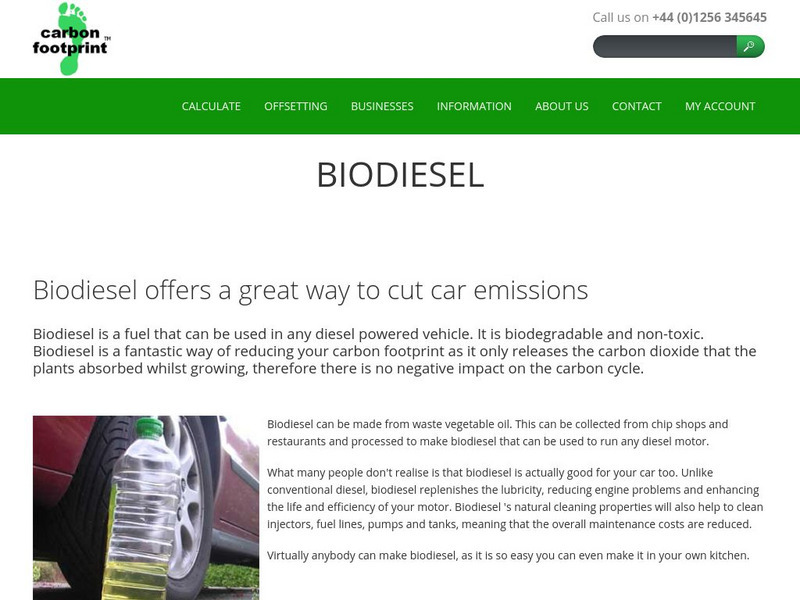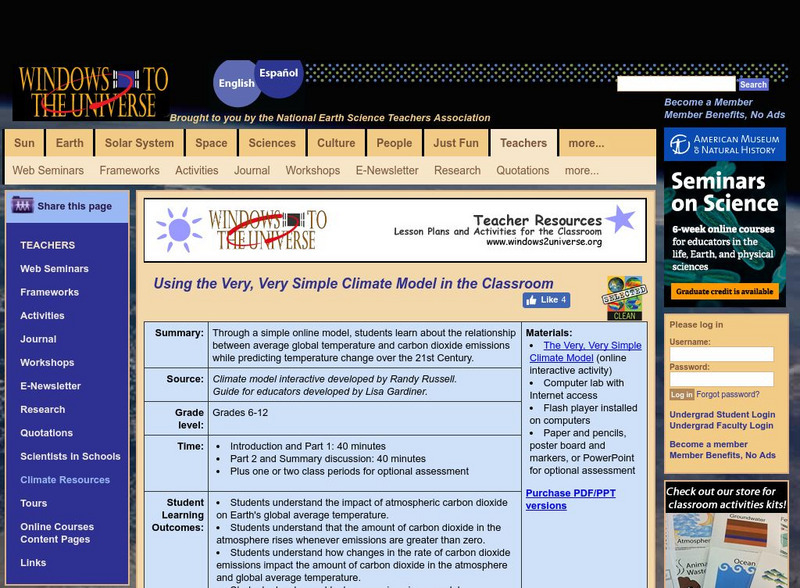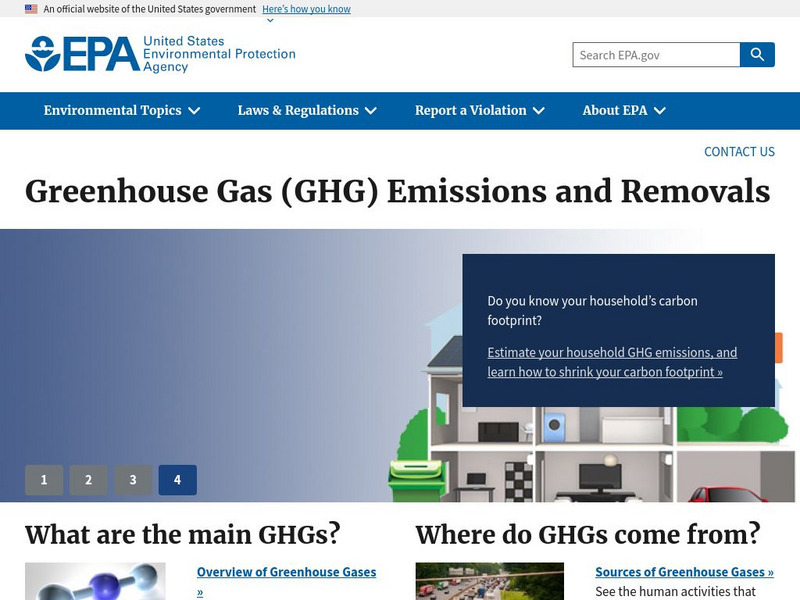Hi, what do you want to do?
Curated OER
What's Making It Look So Brown Outside?
Ninth graders analyze cars and particulate matter in the atmosphere. They analyze results of particulate pollutants and identify which vehicle gives off more particulates. They identify sources of particulate matter and relate to...
Curated OER
You've Got to See It to Believe It!
Fifth graders examine smog and particulate matter as two major visible air pollutants. They discover how the pollutants formed and how engineers work on visible air pollution. They design an advertisement for a hybrid vehicle.
Curated OER
Plants and Air Purity
Students explore how green plants help improve air quality. They read an article and discuss the importance of air quality and its effects on the human body. They investigate by connecting hose to the top of a Bell jar and to a funnel....
Other
Gfdl: Temperature (F) Response Due to Increased Atmospheric Co2
An animated model of the Earth from the Geophysical Fluid Dynamics Laboratory showing how global temperatures increased from 1870 to 2100 due to rising amounts of carbon dioxide in the atmosphere.
Science Education Resource Center at Carleton College
Serc: Estimating Our Carbon Footprint
This is a three-part algebra activity focusing on food-related carbon dioxide emissions.
TED Talks
Ted: Ted Ed: The Carbon Cycle
Video talks about the carbon cycle and uses a computer as a metaphor to show how the cycle can be disrupted by climate change. [3:55] Includes a short quiz and a list of additional resources to explore.
American Museum of Natural History
American Museum of Natural History: Ology: Rising Co2! What Can We Do?
With this resource, students learn how much fossil fuel emissions have increased since 1600 by exploring a graph showing carbon dioxide in our atmosphere. Then answer questions and read facts about climate change over the centuries....
Other
Wards Auto: Auto Maker Fuel Economy, Emissions Improvements on Track
Discusses where the automotive industry was at in 2013 in addressing the problem of carbon dioxide emissions. Smaller car manufacturers face more stringent rules than larger models, while auto makers with lower sales volumes have...
US Environmental Protection Agency
Epa: Household Carbon Footprint Calculator
Enter your household energy data to find out your family's total carbon footprint. Explore some actions to take to reduce your carbon emissions, and then find out your estimated savings once you take those steps.
TeachEngineering
Teach Engineering: Carbon Cycles
Students are introduced to the concept of energy cycles by learning about the carbon cycle. They will learn how carbon atoms travel through the geological (ancient) carbon cycle and the biological/physical carbon cycle. Students will...
National Geographic
National Geographic: The Right Balance: Mixing Energy Resources
In this lesson, students look at profiles of energy production for different regions of the United States. They examine the conversion efficiency and the carbon dioxide emissions of each type of energy, and then the environmental impact...
University Corporation for Atmospheric Research
Ucar: The Very, Very Simple Climate Model Activity
Through a simple online model, students learn about the relationship between average global temperature and carbon dioxide emissions while predicting temperature change over the 21st Century.
Other
Breathing Earth
Breathing Earth layers data about rates of carbon dioxide emission along with birth and death rates onto a map of the world in a real-time simulation of one of the principal greenhouse gases in the Earth's atmosphere, CO2.
US Environmental Protection Agency
Epa: Global Warming Wheel Card [Pdf]
Students construct a Global Warming Wheel Card, a hand-held tool that they can use to estimate their household's emissions of carbon dioxide and learn how they can reduce them.
National Academies of Sciences, Engineering, and Medicine
The National Academies: Emerging Technologies: Advanced Coal Technologies
Coal is still widely used in energy production but is responsible for a third of the carbon dioxide emissions in the United States. New technologies, described here, are being developed to reduce or eliminate these emissions.
PBS
Pbs Learning Media: Prairie Public Education Services Collection
Prairie Public Education Services award winning documentaries on Germans from Russia focus on the rich history of Germans from Russia and their migration to America. Indian Pride, the 13-part cultural magazine, showcases the unique...
Other
Carbon Footprint: Co2 Reduction: Car Travel: Biodiesel
Learn all about biodiesel fuel and see how using it can help to reduce carbon emissions. You can even see how to make biodiesel fuel yourself!
Science Education Resource Center at Carleton College
Serc: From Grid to Home
Students analyze energy use, cost, and source patterns from household to regional scales and relate these patterns to CO2 emissions.
Science Education Resource Center at Carleton College
Serc: The Climate Business Game
CEO2 is a role-playing game that helps students explore different business strategies in order to maximize profit, significantly cut CO2 emissions, and develop low-carbon products by 2030.
National Earth Science Teachers Association
Windows to the Universe: Using the Very Simple Climate Model in the Classroom
Through a simple online model, students learn about the relationship between average global temperature and carbon dioxide emissions while predicting temperature change over the next century.
Other
World Land Trust: Personal Carbon Balanced Calculators
You will find a series of calculators here for exploring what your carbon footprint on the Earth is, based on your use of air travel, your regular means of transportation, your household habits, and fixed carbon dioxide emissions for the...
US Environmental Protection Agency
Epa: Greenhouse Gas (Ghg) Emissions
Earth's atmosphere contains greenhouse gases. Find out what these gases are and where they come from. Also link to other information about how greenhouse gases contribute to climate change.
Climate Literacy
Clean: Carbon Calculator Activity
In this learning activity, students use a web-based carbon calculator to determine their carbon footprint on the basis of their personal and household habits and choices. Students identify which personal activities and household choices...
Texas Instruments
Texas Instruments: Greenhouse Gas Emissions
In this activity, students analyze statistical data using the calculator and the TI InterActive! software. They use linear regression to study the increase in levels of carbon dioxide emission over the years.










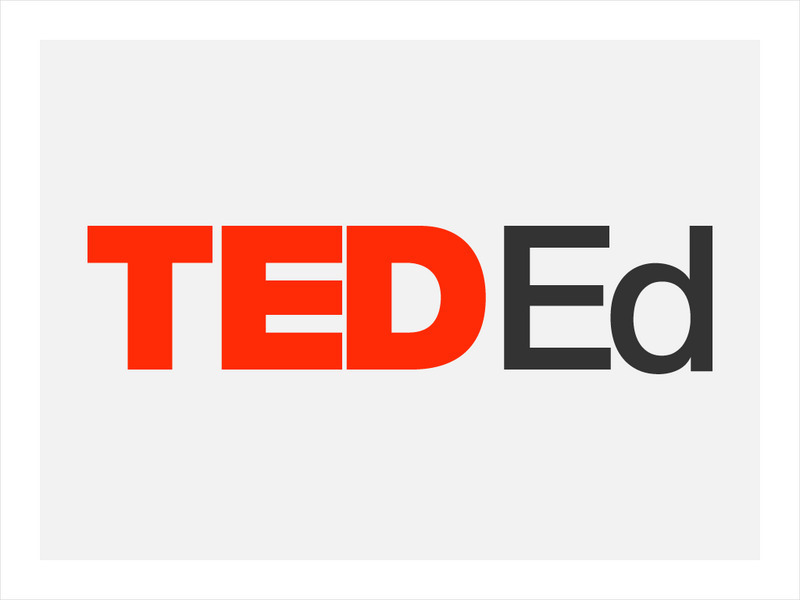

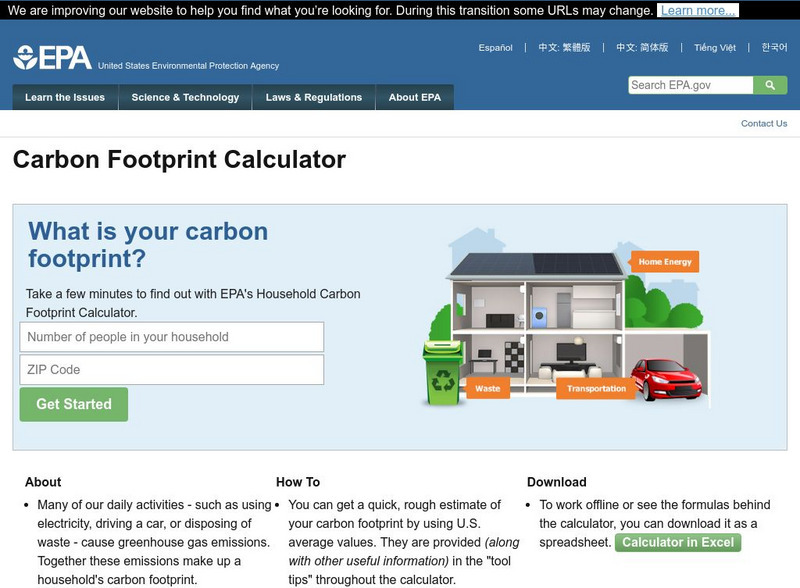



![Epa: Global Warming Wheel Card [Pdf] Activity Epa: Global Warming Wheel Card [Pdf] Activity](https://content.lessonplanet.com/knovation/original/84558-16fbabe6543bc08a2c6e61c7cc193c00.jpg?1661812588)

